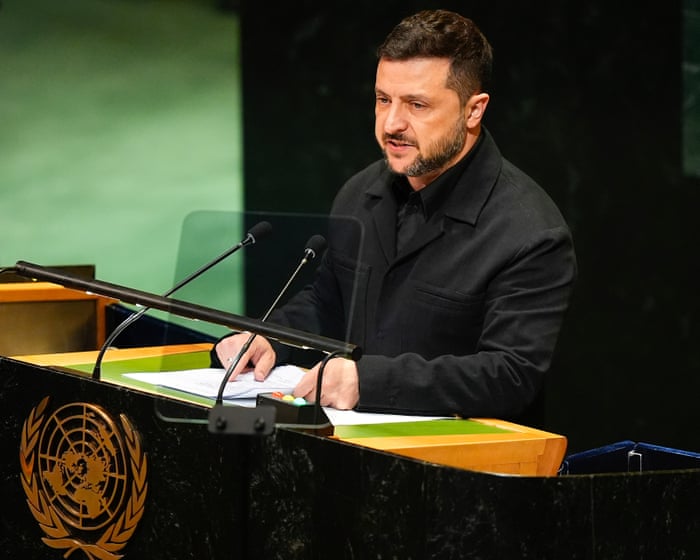Ukrainian President Volodymyr Zelenskyy has called on world leaders to intervene and stop Russia from triggering what he described as “the most destructive arms race in human history.” He warned that the fusion of drone technology and artificial intelligence could lead to catastrophe.
Addressing the UN General Assembly, Zelenskyy aimed to rally not only Western nations but also China. His stark description of how Russia is using technology to transform warfare stood in sharp contrast to Donald Trump’s earlier suggestion that Russia’s military might be a “paper tiger.”
Zelenskyy cautioned that if left unchecked, Vladimir Putin would use drones to expand the war across Europe. “The facts are simple,” he told the UN. “Stopping this war now—and with it, a global arms race—is cheaper than building underground kindergartens or massive bunkers later. Stopping Putin now is cheaper than trying to protect every port and ship from terrorists. Stopping Russia now is cheaper than wondering who might be forced to build a simple drone armed with a nuclear warhead.”
Reflecting on how warfare has changed, he said that a decade ago, “war looked different. No one could have imagined that cheap drones could create death zones stretching dozens of kilometers where nothing moves—no vehicles, no life. People used to think that only happened after a nuclear strike. Now it’s a drone reality, and that’s without AI.”
Referring to recent Russian provocations across Europe, including a drone incursion into Poland, Zelenskyy stated, “Putin is intent on driving the war forward, wider, and deeper… to continue this war by expanding it.” He reminded Europe that he had warned about Russia’s intentions earlier, and now “Russian drones are flying across Europe.” No country, he stressed, is immune to the spread of conflict, adding, “We are living through the most destructive arms race in human history.”
Zelenskyy did not give a broad assessment of the war in Ukraine, nor did he directly address Trump’s unexpected claim that Ukraine could reclaim all territory lost since 2022. He only mentioned having had a “good meeting” with the U.S. president on Tuesday.
He emphasized that in today’s world, “only friends and weapons” protect nations—not international law or UN resolutions. Every country, he said, faces a choice: pursue peace or continue trading with Moscow, thereby aiding Russia. Those who continue funding the war, he argued, are prolonging the captivity of prisoners of war, abducted children, and hostages.
Zelenskyy also expressed concern about Moldova falling under Russian influence. Moldovan Prime Minister Dorin Recean claimed on Wednesday that Russia is spending hundreds of millions of euros to “take power” in an upcoming parliamentary election that could disrupt Moldova’s path toward EU membership.
Before Zelenskyy’s speech, Moscow had dismissed Trump’s shift in tone—including his remark that Russia had been “fighting aimlessly for three and a half years”—a stark contrast to the red-carpet treatment Trump offered Putin during their recent summit in Alaska.
Kremlin spokesperson Dmitry Peskov suggested Trump’s comments were influenced by his meeting with Zelenskyy on the sidelines of the UN General Assembly. “Of course, President Trump heard Zelenskyy’s version of events. And apparently, that version shaped the assessment we heard.”
Peskov also claimed that Russian forces are making slow but steady gains in Ukraine, describing the advance as deliberate and aimed at minimizing losses.
Dmitry Medvedev, Russia’s former president known for his provocative statements, wrote on Telegram that Zelenskyy had drawn Trump into an “alternate reality” where Ukraine could win the war. However, Medvedev expressed confidence that Trump would soon change his stance.No doubt, he’ll be back. He always comes back. Most likely he’ll soon tell Zelenskyy to sign an act of surrender,” wrote Medvedev.
Russian military bloggers highlighted Trump’s comments, interpreting them as an attempt to distance himself from the war—a conflict he once promised to end quickly. A Telegram channel linked to the Russian defense ministry, Dva Mayora, stated, “The US is trying to wash its hands so it won’t lose face if Ukraine collapses.”
On Tuesday, Trump expressed optimism about Ukraine’s chances in the war, asserting that Russia is facing serious economic difficulties. This was one of his most supportive statements toward Kyiv in recent months. He suggested that if the Russian public knew the “real situation with this war,” Ukraine could launch a counteroffensive to reclaim all occupied territory—and possibly even go beyond that.
Trump’s shift in tone is encouraging for Ukraine, but actions are needed beyond words.
Russia’s invasion has significantly impacted its economy. On Wednesday, the finance ministry proposed increasing the value-added tax rate by two percentage points to 22%.
Also on Tuesday, Trump criticized European nations for their “embarrassing” purchases of Russian oil and gas, urging them to “stop all energy purchases from Russia immediately” or risk wasting time. The EU has already cut its Russian oil and gas imports substantially since 2022, with 2024 figures showing Russian gas at 19% and oil at 3%, down from 45% and 27% before the full-scale invasion.
European Commission President Ursula von der Leyen reported that she and Trump agreed during a UN meeting on the urgency of reducing Russia’s fossil fuel revenues. She stated, “By 2027, Europe will have turned the page on Russian fossil fuels for good.” Last week, she announced plans to phase out Russian liquefied natural gas purchases by 2027, a year ahead of schedule, and to sanction 118 vessels in Russia’s shadow fleet used to evade Western price caps.
However, the EU has yet to revoke exemptions granted to Hungary and Slovakia for buying Russian oil in 2022. Both countries oppose the phase-out plan, despite pressure from Trump, who is an ally of Hungarian Prime Minister Viktor Orbán. EU sanctions require unanimous approval, though trade restrictions can be passed by majority vote. Senior diplomats are set to discuss the new proposals in the coming days, but the timeline for agreement remains uncertain.
Frequently Asked Questions
Of course Here is a list of FAQs about Zelenskyys UN address designed to be clear and helpful for a range of readers
FAQs Zelenskyys UN Warning on a New Arms Race
BeginnerLevel Questions
1 What was the main point of Zelenskyys speech at the UN
He warned that Russias actions are pushing the world toward a dangerous new arms race and urged other countries to intervene and stop it
2 What does an arms race mean in simple terms
Its when countries compete to build more and more powerful weapons than their rivals fearing they might fall behind This increases global tension and the risk of war
3 Why is Zelenskyy specifically worried about this now
He believes that if Russia is not stopped in Ukraine it will encourage other aggressive countries to act similarly forcing nations worldwide to massively increase their military spending and develop new weapons to feel safe
4 What kind of intervention is Zelenskyy asking for
Primarily he wants continued and increased military and financial support for Ukraine to defeat Russia He also seeks stronger global sanctions and diplomatic pressure to isolate Russia
Advanced Detailed Questions
5 How could the war in Ukraine trigger a global arms race
The invasion has shown countries that they cannot rely solely on old alliances or treaties for security Nations near Russia and those worried about China are now likely to spend much more on their own defenses which their rivals will then match
6 What makes this potential arms race the most destructive in history
Past arms races like the Cold War were between two main superpowers Today more countries have advanced technology including cyber weapons AIcontrolled drones and hypersonic missiles A modern race would be more complex expensive and involve more players making it harder to control
7 What are the risks for ordinary people if this arms race happens
The main risks are
Less money for other needs Governments might spend less on healthcare education and infrastructure to fund the military
Higher global tension A more heavily armed world is a more nervous world where small conflicts could escalate faster
Proliferation of weapons Advanced weapons technology could spread to more countries and nonstate groups



